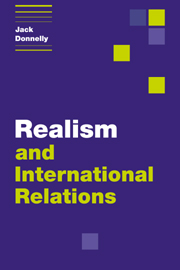Book contents
- Frontmatter
- Contents
- Acknowledgments
- Introduction
- 1 The realist tradition
- 2 Human nature and state motivation
- 3 Anarchy, hierarchy, and order
- 4 System, structure, and balance of power
- 5 Institutions and international society
- 6 Morality and foreign policy
- Conclusion: The nature and contribution of realism
- Selected recommended readings
- References
- Index
Conclusion: The nature and contribution of realism
Published online by Cambridge University Press: 04 December 2009
- Frontmatter
- Contents
- Acknowledgments
- Introduction
- 1 The realist tradition
- 2 Human nature and state motivation
- 3 Anarchy, hierarchy, and order
- 4 System, structure, and balance of power
- 5 Institutions and international society
- 6 Morality and foreign policy
- Conclusion: The nature and contribution of realism
- Selected recommended readings
- References
- Index
Summary
Realists such as E. H. Carr and John Herz – and, if my interpretation in the preceding chapter is correct, Thucydides and Machiavelli as well – see realism only as a starting point for or a single dimension of international theory. And they insist on keeping “realist” insights in dialectical tension with higher human aspirations and possibilities. As Carr puts it, “the impossibility of being a consistent and thorough-going realist is one of the most certain and most curious lessons of political science” (1946: 89). This brief Conclusion attempts to develop this reading of the nature and contribution of realism.
The negative, cautionary character of realism
The recurring patterns realists identify are not timeless laws of international relations. Realism identifies constraints, not unbreakable barriers. And other patterns and processes that are no less important to the study and practice of international relations are largely outside the scope of realism's comprehension. For example, granting Machiavelli's claim that men “will always give vent to the malignity that is in their minds when opportunity offers” (1970: Book I, ch. 3) no more suggests an amoral foreign policy than it implies that domestic law should treat the innocent and the guilty alike. As I have argued repeatedly, the need for caution must not be confused with the invariance or inevitability of that which demands caution.
Many postwar realists admit the reactive, negative character of their work. Georg Schwarzenberger, in the preface to the second edition of Power Politics, noted that in 1941 “it was necessary to be on guard against naive day-dreaming on international politics.
- Type
- Chapter
- Information
- Realism and International Relations , pp. 193 - 202Publisher: Cambridge University PressPrint publication year: 2000



